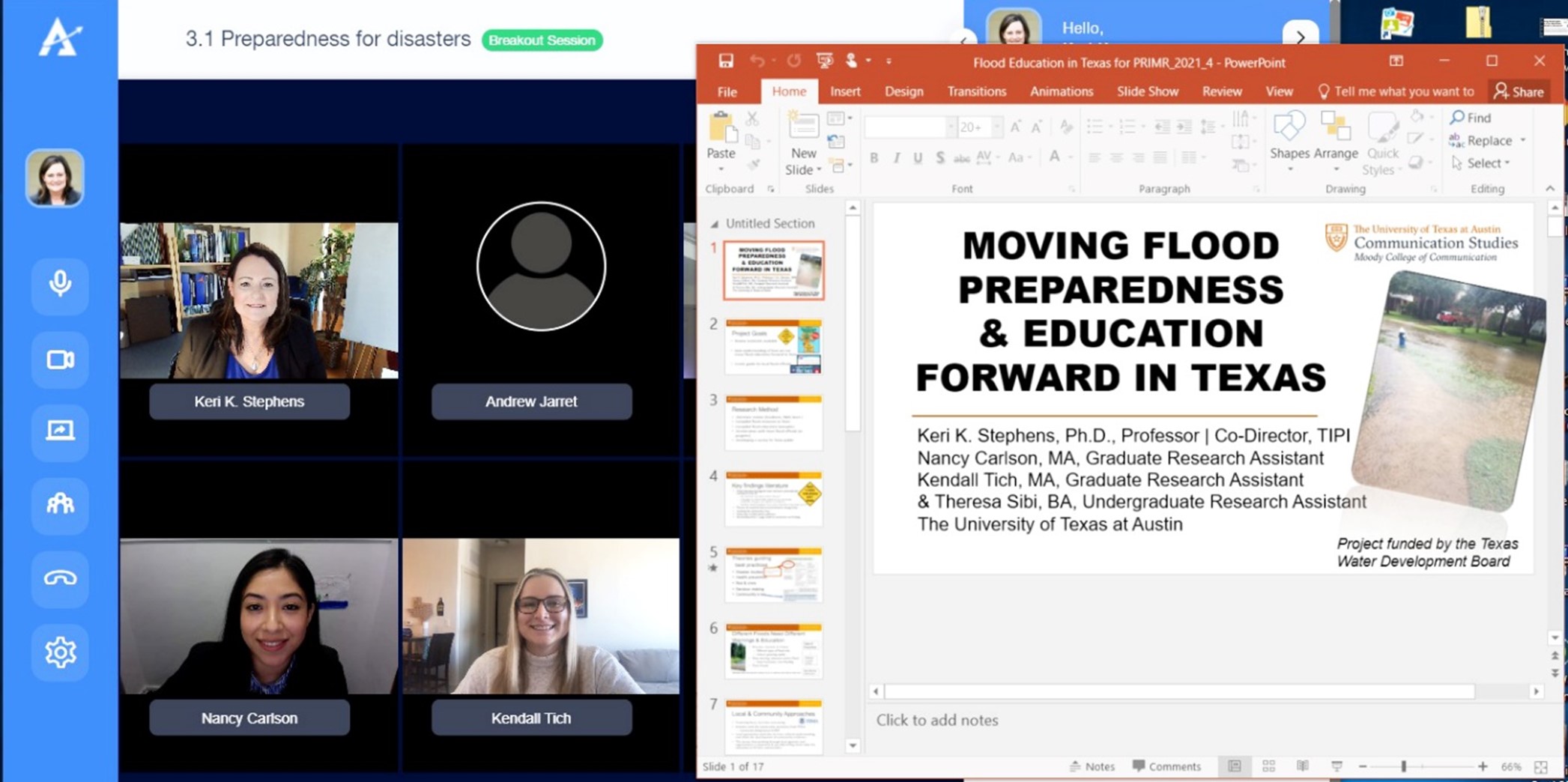Communicating Flood Risk for Texas
Project Description
Think about it… Did you ever learn how to protect yourself against flooding when you were growing up? Probably not, unless you grew up in a flood prone area. However, flood prone areas in Texas have expanded rapidly in the past decades, yet we still do little to help people understand floods. Texas ranks first in the US in the variety and frequency of natural disasters.
In this project, TIPI Co-Director, Keri Stephens and her team are conducting a multi-method study around flood communication and education in Texas. The project is funded by the Texas Water Development Board.
This is a multi-part study funded by the Texas Water Development Board. The first phase of the project developed a guide for local flood officials to help them have flood communication resources to share with their communities. Here is a link to the guide.
The second phase of the project developed flood awareness messages for four different target audiences: Newcomers to Texas (extreme growth is in flash flood alley and Harris County), Adult Males 18-35 years of age (most likely to drive through flood waters and die), Older Adults (a growing population in Texas), and Spanish Speakers. To learn more about the messages developed, here is an overview:
and watch this video:
Download the video here.
The third phase of the project focused on developing guidelines for how to communicate and visualize flood risk for property owners/renters, organizations with employees, and Spanish Speakers. This is responding the Texas Integrated Flooding Framework (TIFF) initiatives.
Our Team
Keri K. Stephens (PI, Organizational Communication), Matthew McGlone (Interpersonal Communication), Sean Upshaw (Advertising & PR), & Suzanne Pierce (Texas Advanced Computing).
Postdoctoral Scholar: Samanta Varela; Graduate Students: Nancy Carlson, Jovana Andelkovic (Organizational Communication)
Students and staff who have graduated, but contributed to this team: Dr. Kendall Tich, Dr. Brett Robertson, Theresa Sibi, Dr. Tara Tasuji, Elizabeth Lee, and Nikita Chandakar.
Research Questions
- How can we move flood education forward in Texas?
- What resources would help local flood officials educate and communicate flood risk to their communities?
- How do Texas seek flood risk and mitigation information?
-
Which audiences in Texas should be prioritized to receive flood information
-
What messages can raise flood awareness for each prioritized group?
Research Method
- Literature review (Academic, NGO, Govt.)
- Compiled flood education resources in Texas
- Compiled flood exemplars
- Over 20 interviews with Texas flood officials
- Conducted a survey with Texans in areas with higher and lower flood risk and published this article
Presentations
Narrowing the Gap Between Technical Flood Knowledge and Nontechnical Audiences (November 2024)
As technical experts we tend to identify good technical solutions and then we just want people to adopt our good ideas. This video shares key examples from Texas where we are transitioning our thinking about the public and other less technical audiences as being passive recipients to active participants in making systems/processes functional and lives better.
Presenter: Keri K. Stephens
Moving flood preparedness and education forward for Texas (February 2021)
Our team presented the early results from our TWDB project for the Disaster PRIMR Conference where Texas researchers, NGOs, and governmental organizations shared best practices.
Team: Keri K. Stephens, Nancy Carlson, Kendall P. Tich, & Theresa Sibi

Other Presentations
Keri K. Stephens, Nancy Carlson, Kendall P. Tich, & Brett W. Robertson will be presenting their paper, Caring for communities by tailoring hazard approaches: Synthesizing interdisciplinary research to set a research agenda for flood preparedness, at the International Communication Association (ICA), Denver, CO. (Virtual Conference).
Blogs
Strengthening Community Resilience: Connecting Online and Offline Networks
An interdisciplinary team of researchers from the University of Texas at Austin (including TIPI researchers) explored how Texas communities responded during the 2021 winter storm.
Investigating Ways to Better Communicate Flood Risk
There are very few current flood maps designed to actually help people understand their flood risk…
How Residents in Texas Seek Flood Risk Information
A shared sense of duty around seeking flood information is the most important factor behind Texas residents’ motivations to search for flood information.
Communicating & Visualizing Flood Risk
Project Description
This study addresses the Texas Integrated Flooding Framework (TIFF) components 2 (visualization) and 4 (communication) objectives. Our goals are to deeply explore the academic and grey literature around best practices in communicating and visualizing flood risk and develop guidelines that can be used as new dashboards and products are created from flood models. Along the way, we are identifying prioritized public users of this type of information and the types of decisions they need to make around flooding. We have conducted end-user definition workshops and online experiments to better understand what constitutes appropriate guidelines for property owners, organizations that care for others, and Spanish speakers.
Phase II of this project will focus on the Lower Rio Grande Valley and we will determine culturally appropriate ways to communicate flood risk to property owners, small business owners, and Spanish Speakers.
Our Team
Suzanne Pierce, Ph.D. (TACC), Samanta Varella, Ph.D., Jovana Andelkovic, & Nancy Carlson
Contact us
Find Us
2504 Whitis Ave.
CMA 5.102
Austin, TX 78712
Phone
512-471-5826
Social
Twitter: @texastipi
Facebook: @texastipi
